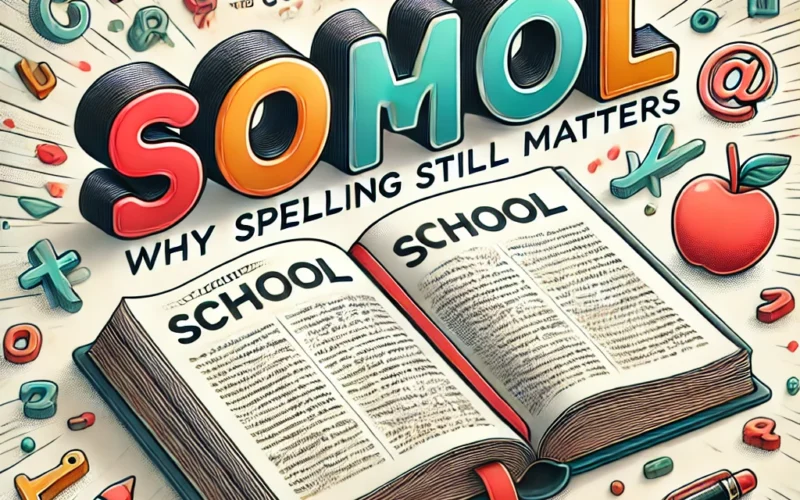In today’s fast-paced digital world, spelling might seem like a trivial detail. Yet, certain phrases, like “the correct spelling is school not school. some pe – tymoff,” highlight the humour, frustration, and importance of getting words right. This phrase has sparked conversations, curiosity, and even laughter. Why does spelling still matter? Let’s dive into the quirky appeal of this phrase, explore common spelling pitfalls, and examine the role of correct spelling in our lives.
Introduction to the Phrase: What Does “Some Pe – Tymoff” Mean?
“The correct spelling is school not school. some pe – tymoff” has an odd charm. It seems like a typographical error or a playful twist on language that stops readers in their tracks. The term “some pe – tymoff” doesn’t make immediate sense, making it feel almost like an inside joke that we’re all curious to understand. Whether intentional or not, phrases like this play on our expectations for clear communication, poking fun at how even simple words like “school” can be easily misspelt or misunderstood.
This phrase taps into a larger trend: using humour and ambiguity to make people think twice about language. The phrase draws readers in, combining a sense of irony with a slight mystery that encourages us to look closer. It’s a reminder that language, even when incorrect, can be both entertaining and thought-provoking.
Why Correct Spelling Matters in Digital Communication
In the digital age, spelling is more important than ever. Misunderstandings happen quickly, especially online, where messages spread instantly. Whether it’s a text, tweet, or email, small mistakes can create confusion or even misinterpretation. When words like “school” are misspelt, readers might question the message’s credibility or seriousness.
Correct spelling reflects professionalism and attention to detail, and errors, even minor ones, can affect how we’re perceived. In formal communication, spelling mistakes may create a lasting impression—often not a good one. This is why taking time to proofread and ensure accuracy, even in digital conversations, can make all the difference.
How to Avoid Common Spelling Pitfalls in English
English is notorious for being tricky with spelling. Here are some common errors and tips to steer clear of them:
- Skipping Letters – Words like “school” often end up misspelt as “school.” Remembering that “sch” makes the “sk” sound can help keep the correct spelling in mind.
- Transposing Letters – Mistyping “school” as “school” is common. Double-checking can catch these small slips.
- Phonetic Spellings – Sometimes, words like “skool” show up, especially in casual contexts. Although phonetic, they can lead to misunderstandings.
Using tools like spellcheckers, or even mnemonic devices, can make a significant difference in catching and avoiding these common pitfalls.
Exploring Language Trends in Online Memes and Humor
Language is constantly evolving, and phrases like “the correct spelling is school not school. some pe – tymoff” capture this change in an almost meme-like fashion. Today’s digital platforms allow trends and phrases to spread rapidly, and language is often adapted for humour or irony. Words are twisted, meanings are doubled, and sometimes new terms or inside jokes are created.
This particular phrase pokes fun at both the importance and irrelevance of spelling in our current world. Online, where memes often use incorrect grammar and spelling intentionally, this phrase could be viewed as a satirical comment on how much we care—or don’t care—about getting words right.
Tools and Tips to Improve Your Spelling
With technology at our fingertips, there’s no excuse not to take advantage of tools that improve our spelling skills. Here are a few effective strategies:
- Spellcheck – A simple yet powerful tool available on most devices, it can catch mistakes but isn’t foolproof. Double-checking is always a good idea.
- Mnemonics – A mnemonic like “Silly Cats Hate Orange Owls Learning” can be fun and effective for remembering difficult spellings.
- Practice and Visualization – Repeatedly writing out and visualising words helps create a mental picture that makes correct spelling easier to remember.
By using these methods, you can quickly improve your spelling accuracy and build confidence in your writing.
The Role of Autocorrect and AI in Common Misspellings
While autocorrect can be a lifesaver, it can also introduce errors, especially with words that are frequently misspelt, like “school.” Autocorrect may sometimes suggest incorrect alternatives, leading to humorous or confusing outcomes.
AI-based tools and autocorrect have their limitations, but understanding their quirks helps us anticipate and catch potential errors. For example, autocorrect might “fix” words based on previous usage patterns, so always double-check that the intended spelling appears in your final message.
The Importance of Proofreading in Preventing Errors
No matter how advanced our tools become, nothing beats good old-fashioned proofreading. Taking a moment to review your writing catches errors and gives a chance to improve clarity. Whether you’re preparing a professional document or a casual email, proofreading is the final line of defence against simple mistakes.
Here are some quick tips:
- Read Aloud – This helps catch errors that might be overlooked when reading silently.
- Use Different Tools – Grammar and spell-check tools are invaluable, but they miss context-specific errors, so relying on a combination is wise.
- Take Breaks – Fresh eyes often spot what the mind glossed over initially.
Conclusion: Why We Should Care About Spelling in a Fast-Paced World
In a world where everything is speeding up, taking a moment to check our spelling and accuracy can make all the difference in communication. Phrases like “the correct spelling is school not school. some pe – tymoff” are entertaining reminders of the quirks in our language. At the same time, they underscore the importance of clear and correct spelling.
This phrase captures the humour and challenges of language. Whether we’re aiming for precision or just having fun, paying attention to our words builds credibility and shows respect for our readers. In today’s fast-paced world, a moment’s attention to detail can go a long way in effective and meaningful communication.

